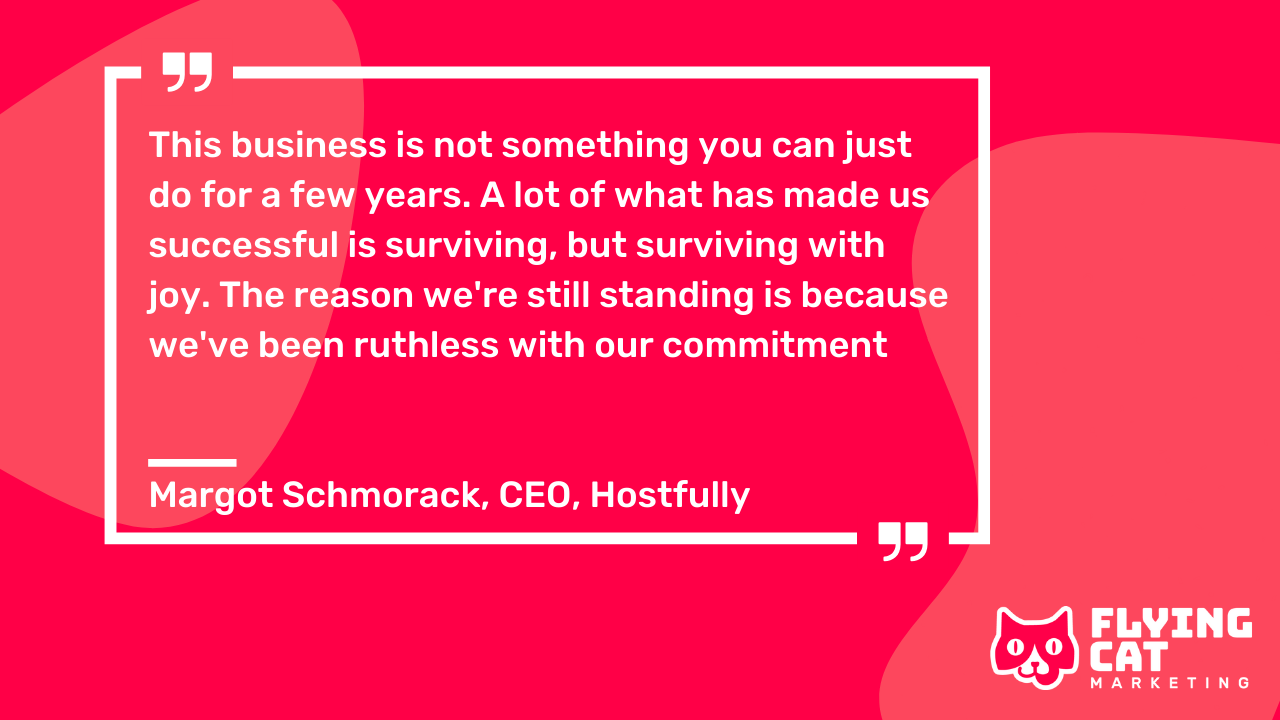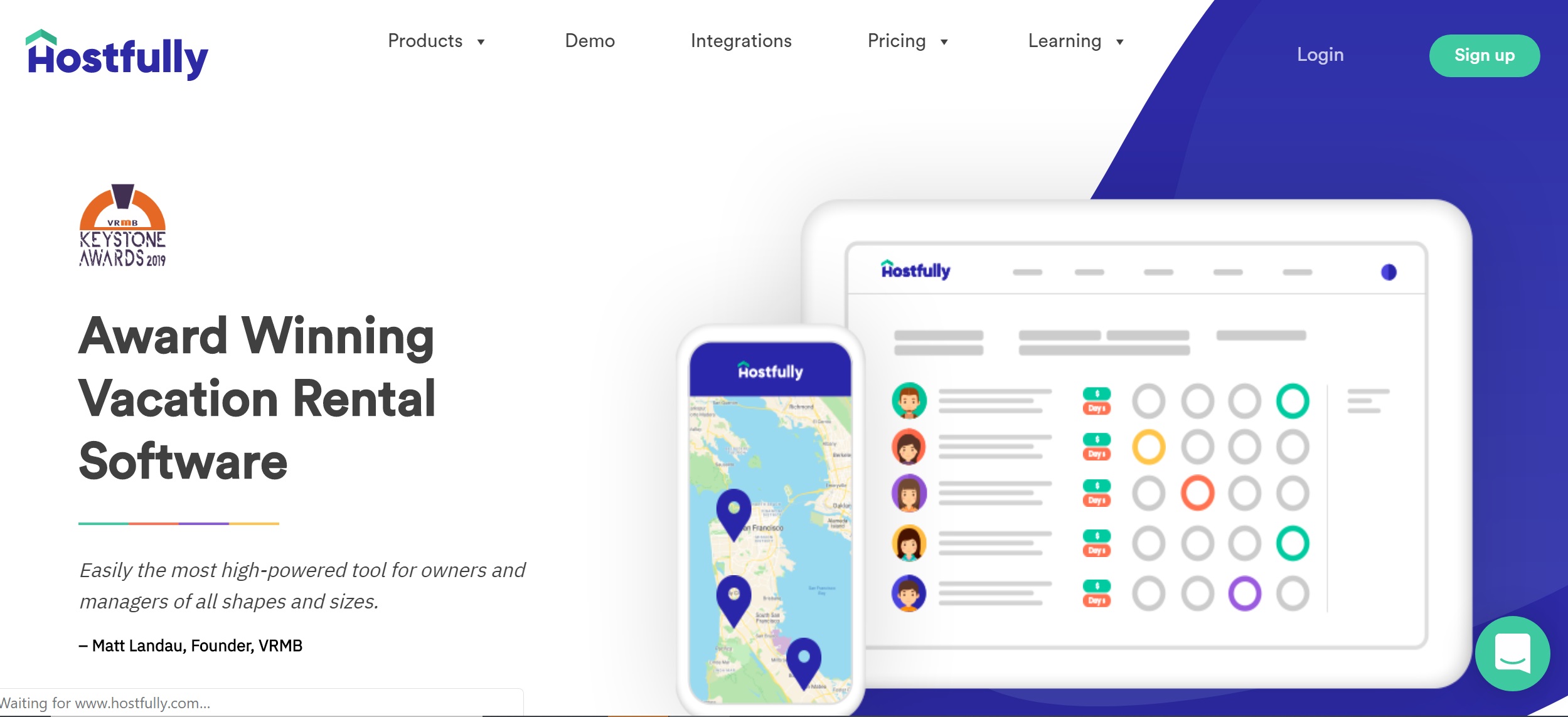If you’re like a lot of SaaS founders, your goal may be to build, scale and exit.
But building a brand that dominates takes a long time. It’s not something you can do in just 2-3 years, but something you need to invest in and be committed to.
Shopify was founded in 2006 but didn’t see a Series A until 2010. It grew rapidly after that, reaching Series C only 3 years later.
MailChimp took 17 years to become the email marketing levathian it is now.
The qualities those founders shared were grit, patience, and listening skills.
Qualities shared by Margot Schmorak, CEO of Hostfully.
[tcb-script src=”https://www.buzzsprout.com/1399351/9078281-replay-the-hostfully-founder-story-from-a-free-product-to-a-powerful-saas.js?container_id=buzzsprout-player-9078281&player=small” type=”text/javascript” charset=”utf-8″][/tcb-script]
Hostfully started as a free personalized guidebook for vacation rental guests, and pivoted twice before becoming a must-have for vacation rental hosts. It’s still almost entirely owned by the co-founders and just received its seed round in 2019.
“I really wanted to be part of a company that is having a bigger impact.” Margot told me “but faster – I want to be part of a faster growth company. And David (co-founder) did, too. And our investors did as well.“
It was the evening for me in Barcelona and just the beginning of the day for Margot in her San Fransisco home.
We’re 9 hours apart, but in a similar situation: stuck at home in lockdown. Just like the rest of the world.
Margot joins the Zoom call with the postivie, good-natured demeanor of a goal-driven startup CEO who isn’t easily disheartened by another bump in the road.
This wasn’t Margot’s first experience in the startup world: she led Marketing and Strategy for the $200M business unit at ServiceSource. She was on the management team at Coveroo, a venture-funded startup that pivoted from software to iPhone cases and was sold to Zazzle in 2012. And back in 2008, she launched the iPhone Developer Program at Apple.
She has a high tolerance for pivoting, and a strong ability to see the forest for the trees.
Quality traits of a startup entrepreneur, if you ask me.
In today’s episode, we chat about how:
✅ Building a brand is a long-term commitment
✅ Hostfully’s pivots were necessary for growth
✅ Listening to customers helped drive their decisions
✅ Customers know what they want – you just have to ask them
Hostfully’s startup story: Building a brand is a long-term commitment
Hostfully is a graduate of the Blue Startups accelerator program.
While the program was full of ambitious entrepreneurs, too many of the companies of her fellow graduates no longer exist.
Now, Hostfully has an estimated valuation of $4-$6 million.
At the time of our interview, mid-March 2020, when the whole short-term rental and travel industry was collapsing, they were still getting sign-ups to their product.
What made them stand out?
Patience and ruthless commitment to growing Hostfully. A value proposition driven by listening to their customers.

Margot watched Hostfully grow with some mixed emotions. Two years in, she had to do some soul-searching to see whether this was what she really wanted to do. It turns out, the only way to get to what she really wanted was ruthless commitment.
Hostfully’s pivoting story
Hostfully has pivoted twice since it joined the startup world.
First, it was a free tool that property managers could use, and it was primarily funded through affiliate and partnership deals. They had hundreds of sign-ups within the first month of launching, without marketing.
They realized affiliate revenue was not the formula for the rapid growth they were seeking.
Their pivot wasn’t a guess – it was their customers who asked for it: “we had a few property managers who said, hey, if you could do this for my 50 properties, I would be happy to pay you for the services subscription.”
So they switched to a SaaS model.
Some time later, SaaS revenue was growing slowly, but Margot still wasn’t satisifed.
They began by asking themselves the usual questions:
- How can we make ourselves more valuable to our customers?
- How can we expand our value proposition?
There’s only one way to get the right answers to these questions – ask your customers.
So they ran a series of customer interviews and a clear value proposition came to light.
Turns out, every single customer they spoke with wanted a platform to be able to integrate property management with the digital guidebook.
They wanted help keeping track of property data, distributing listings and running basic reporting.
So they merged with a company that offered this feature, and so was born the new Hostfully product: beautiful personalized guidebooks and property management software.
We wrote a free guide on how to ask your customers the right questions

How Hostfully talks to its customers
Hostfully has an advantage – Margot’s co-founders, David Jacoby and Stephan Osmont, are also an Airbnb superhost and a property manager, respectively (their target audience).
So they already had some insight on what this avatar might need.
But the short-term rental industry has a large range of avatars – from the side-hustling, 1-unit host to professional operators with tens or hundreds of listings. They needed to talk to more people.
Margot’s trick is simple: “You have to ask the right questions and then you have to shut up. It’s as simple as that.”
They survey their customers frequently, but she says the best listening is done at industry conferences:
Going to these conferences and talking to people – but the gold is listening to them talk to each other.
The best kind of listening is when someone is sharing freely, without feeling observed. Talking to your colleague at a conference is not the same as a marketer asking you how a product makes you feel.
You’re not making them feel uncomfortable or spied on.
It’s just going to be more off-the-cuff, casual talk.
Instead of using trade shows to sell your product, you go as a participant to listen and build relationships.
“It’s about building a relationship or you’re in the right place at the right time. And then also just being ready to truly listen.”
Listening to customers helped guide their pivot strategy and it guides their content creation. They only create content that their customers really want, guided by their surveys and candid conversations.
Customers know what they want
Customers know what they want, and know how your product or content could be better.
It’s not up to you to read their minds or to guess.
It’s up to you to start conversations and ask them directly.
Do you talk to your customers? What’s holding you back from doing it?
We wrote a free guide on how to ask your customers the right questions
